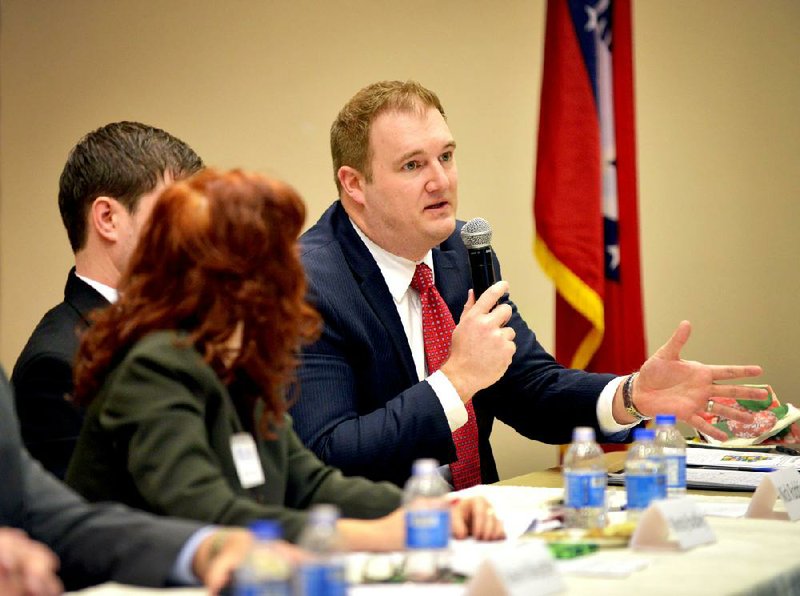BENTONVILLE -- Fixing the Arkansas prison system is more complicated than building more facilities, prison experts agreed during a forum sponsored by NWA Public Discussion on Tuesday.
"If anything is true about government, it is that anytime you build it, they will come," said Jesse Wiese, policy analyst for Justice Fellowship, located in Virginia. "You cannot build yourself out of this problem."
About 17,864 people are currently incarcerated in Arkansas, according to Arkansas Department of Correction data. About 2,444 of those individuals are being housed in county jails because of overcrowding in the prison system.
About 70 people attended the event held at Northwest Arkansas Community College at Bentonville. Those who attended included mental health specialists, nonprofit directors who work with prison populations and local elected officials.
NWA Public Discussion is an organization that sponsors public conversations on issues facing the region. The events are coordinated by former Circuit Court Judge Jon Comstock of Comstock Conflict Resolution Services.
The forum participants agreed that focusing on recidivism rates is one key to solving what they called a growing economic problem. Yet, the experts did not necessarily agree on the best way to address the issue.
About 42.2 percent of 10,072 Arkansas inmates were sent back to prison within three years after being released, according to Correction Department data.
Options for lowering the recidivism rate include lowering parole officers' caseloads along with expanding specialized courts such as drug, veteran and mental health courts. Another suggested option would increase funding for nonprofit organizations that help felons after they leave prison.
Kevin Murphy, assistant director of Arkansas Community Correction, said parole officers in Arkansas have an average of 130 individuals to oversee at one time. The national average is 60 parolees to one parole officer.
"When you reduce caseloads, they succeed more," Murphy said.
Parole officers are able to give more individualized care when they have fewer cases, Murphy said.
Mindy Bradley, University of Arkansas associate professor in the department of sociology and criminal justice, agreed that smaller caseloads for parole officers could help. However, she also believes that national data has proven specialized courts are working.
Specialized courts have higher success rates and cost less than sending an individual to prison, Bradley said. She said research has shown it costs, on average, $1,500 less to send a defendant through a specialized court rather than the traditional court system.
Murphy said that specialized courts could be just as effective in lowering parole officers' caseloads. He said most specialized courts have much smaller caseloads.
"We should run probation and parole just like that for everyone," Murphy said.
Bradley said the smaller caseload is an advantage of specialized courts. Additional resources also benefit the courts, she said. Specialized courts often require targeted treatment such as drug rehabilitation or mental health services.
Nick Robbins, a re-entry specialist for Pathway to Freedom, believes nonprofit organizations that help individuals re-enter society after prison are a valuable resource. Pathway to Freedom contracts with the CorrectionDepartment to provide pre- and post-release services.
At 17, Robbins was incarcerated in 2000 for armed robbery in Iowa. He credits a program like Pathway to Freedom for his transition back into society. He said the programs provide housing for those leaving prison along with assistance finding a job.
"We need to put an infrastructure in place," Robbins said.
The panelists said support from politicians, including the governor, is needed to move forward with any of the options.
NW News on 12/10/2014

